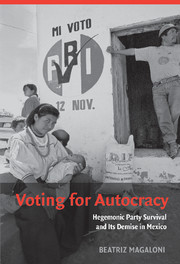Book contents
- Frontmatter
- Contents
- Acknowledgments
- INTRODUCTION
- 1 EQUILIBRIUM PARTY HEGEMONY
- 2 STRUCTURAL DETERMINANTS OF MASS SUPPORT FOR THE PRI
- 3 BUDGET CYCLES UNDER PRI HEGEMONY
- 4 THE POLITICS OF VOTE BUYING
- 5 JUDGING ECONOMIC PERFORMANCE IN HARD TIMES
- 6 IDEOLOGICAL DIVISIONS IN THE OPPOSITION CAMP
- 7 HOW VOTERS CHOOSE AND MASS COORDINATION DILEMMAS
- 8 ELECTORAL FRAUD AND THE GAME OF ELECTORAL TRANSITIONS
- 9 CONCLUSION
- References
- Index
- Cambridge Cultural Social Studies
3 - BUDGET CYCLES UNDER PRI HEGEMONY
Published online by Cambridge University Press: 06 August 2009
- Frontmatter
- Contents
- Acknowledgments
- INTRODUCTION
- 1 EQUILIBRIUM PARTY HEGEMONY
- 2 STRUCTURAL DETERMINANTS OF MASS SUPPORT FOR THE PRI
- 3 BUDGET CYCLES UNDER PRI HEGEMONY
- 4 THE POLITICS OF VOTE BUYING
- 5 JUDGING ECONOMIC PERFORMANCE IN HARD TIMES
- 6 IDEOLOGICAL DIVISIONS IN THE OPPOSITION CAMP
- 7 HOW VOTERS CHOOSE AND MASS COORDINATION DILEMMAS
- 8 ELECTORAL FRAUD AND THE GAME OF ELECTORAL TRANSITIONS
- 9 CONCLUSION
- References
- Index
- Cambridge Cultural Social Studies
Summary
A central empirical implication of my theory presented in Chapter 1 is that there would be budget cycles or an increase in government spending around elections, when the hegemonic coalition is most vulnerable to potential challengers, including those resulting from splits within the ruling party. Budget cycles would occur even when elections were not competitive, and would become more pronounced when the opposition strengthened. My approach also predicts that splits within the ruling party would tend to occur in part due to failures to distribute enough material rewards to the members of the ruling coalition. This chapter tests these hypotheses against the empirical evidence. I answer the following questions: first, is there systematic empirical evidence that the PRI flooded districts at election time with generous amounts of government spending? Second, is there evidence that electoral business cycles took place even when elections were not competitive? Third, do other policy instruments and variables, such as the money supply, inflation, and economic growth, also move according to the electoral calendar?
The chapter unfolds as follows. The first section summarizes the literature on electoral business cycles, which was developed for competitive democracies. The second section presents a discussion of budget cycles in light of some conventional views about the Mexican political system. The third section analyzes government spending patterns between 1938 and 2000. The fourth and fifth sections present evidence of the movement of inflation, the money supply, nominal wages, and the exchange rate according to the electoral calendar.
- Type
- Chapter
- Information
- Voting for AutocracyHegemonic Party Survival and its Demise in Mexico, pp. 98 - 121Publisher: Cambridge University PressPrint publication year: 2006



